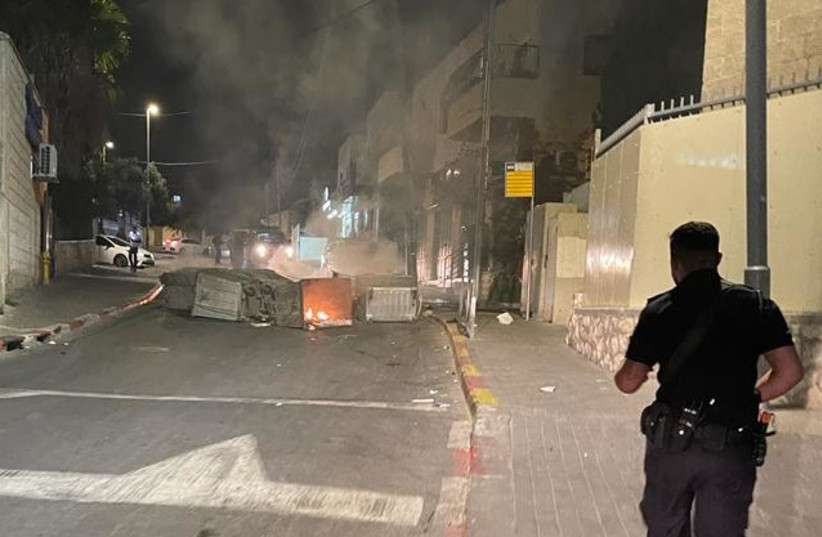Prime Minister Yair Lapid’s statement to the UN General Assembly received applause from President Joe Biden, who said, “I welcome Israeli PM Lapid’s courageous statement at the UN General Assembly: ‘An agreement with the Palestinians, based on two states for two peoples, is the right thing for Israel’s security, for Israel’s economy, and for the future of our children.’”
Put your money where your mouth is
It would be the right thing for President Biden to follow up with recognition of the other of the two states, instead of just merely applauding empty words. I would really like to believe that Prime Minister Lapid is truly interested in a two-state solution, but there is absolutely no evidence from anything that he has ever done in his entire political career to substantiate that claim.
When Lapid was first elected to the Knesset, Palestinian President Mahmoud Abbas asked me to extend an invitation to him to meet, in private, or in public, “whatever Mr. Lapid desires.” That invitation was rejected. Following that, President Abbas asked me to extend an invitation to any member of Knesset from Yesh Atid to come to Ramallah to meet him. There were several Yesh Atid MKs who expressed interest at the time, but Lapid vetoed their participation.
After that rejection, I had several interactions with then-MK Ofer Shelah, who was then the closest person to Lapid within the party. While it seemed that he was personally interested in meeting Abbas, he made it clear that no such meeting would take place.

Were Lapid’s words in the UN empty words, or did they truly reflect what he believes? If yes, can they be translated into an effective plan that could get the parties back to the negotiating table? We have to understand that there is no possibility of an imposed solution to this conflict.
It is not possible for Israeli unilateralism to lead to anything else but continued violence. There may no longer be a viable two-state solution, but what should be one hundred percent clear, is that there will be no solution without agreement on both sides of the conflict, and it is highly unlikely to reach an agreement without sitting together at the negotiating table.
ONE OF Lapid’s achievements, since taking office as prime minister, was convening the Negev Summit at the end of March 2022. Lapid sought to advance the positive relations coming out of the Abraham Accords. It was a positive move, but at least two essential parties were absent: Jordan and the Palestinians.
My constructive proposal to Lapid is that he should ask one of the regional partners, perhaps Bahrain, to convene a summit now – even before the elections – with leaders of the region. This time it should include Egypt, Jordan, Morocco, UAE, Turkey, and of course the Palestinians, and put back on the table the issues of two states, security for Israel and the Palestinians and the region, prosperity and economic development, energy, climate change, technology, food security, and more.
Lapid should request that the king of Bahrain invite a senior Saudi representative to attend this summit as an observer, or as a full participant if they choose so. This summit would launch a process; it would not reach an agreement and a solution. But this process would demonstrate Lapid’s leadership and vision and would also reveal that Lapid’s UN speech was not a conglomeration of nice but empty words.
It is completely legitimate for the prime minister of Israel to act prime ministerial even before elections. It might even give him the push over the line that is necessary for him to retain his position as prime minister.
The people of Israel have always wanted peace with all of their neighbors, but it has been many years since they last saw a genuine effort to reach it and have come to believe that there are no partners on the other side. A regional summit, as I propose, would help convince all of the people in the region that there are now partners who are genuinely interested in making peace, not just speaking empty words of peace.
Israel and the Palestinians need a regional solution because the bilateral efforts have unfortunately failed beyond imagination. The regional partners are committed to advancing peaceful relations and have proven that over the past two years. The peace treaties with Egypt and Jordan would become much more substantial if the Palestinian issue was back on the table. The Saudis have already stated that they will only join the process when the issue of Palestine is back on the table and being dealt with seriously.
Even the relations between Israel and Turkey would be greatly improved by inviting the Turks to participate and be part of the regional architecture aimed at peace, security and prosperity. A regional agreement would provide additional means for confronting security threats and would also provide the means for ensuring the success of a Palestinian state. A regional security force could be established that would enhance whatever security protocol the Israelis and Palestinians agree on. This kind of process would receive wide support from the international community as well.
Politically, for Lapid, this move would put him way out in front as a leader of world stature, a man with a vision and the ability to make hard decisions and to implement them. The November 1 elections would essentially become a referendum from the Israeli public on the question of Israel’s regional relations. I believe that a significant majority of the people of Israel would support this process.
The writer is a political and social entrepreneur who has dedicated his life to the State of Israel and to peace between Israel and her neighbors. He is now directing The Holy Land Bond.
